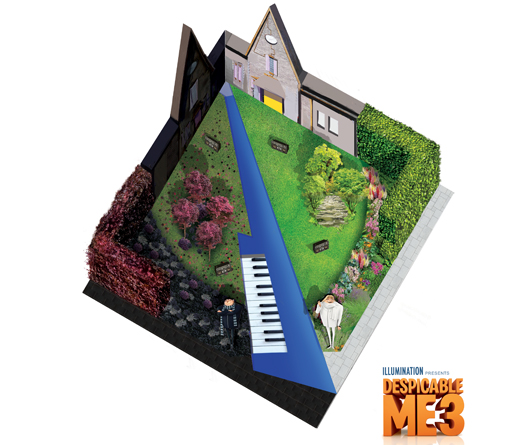![]()
A short while ago I received an unexpected phone call. Did I know of anyone who could remove a swarm of bees from a tree in a garden? The family in question were alarmed to see so many bees that close to their home and were at a loss to know what to do.
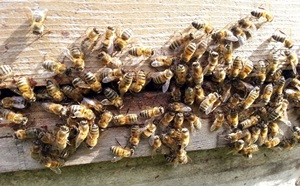
I pointed them in the direction of the mid-Kilkenny Bee Keepers Association who can help with bee swarms and subsequently received a text letting me know it had been sorted, so I guess the group had helped or the bees had moved on.
Perhaps it was no coincidence when I heard the following day that the Association would be extracting honey from the apiary at Lavistown House in Kilkenny and that anyone was welcome to watch. Mr G and I headed along with our youngest to find out more.
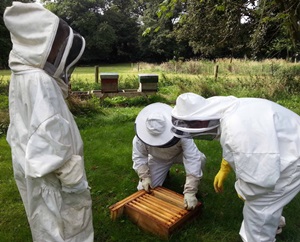
Mid-Kilkenny Bee KeepersWe’ve been thinking about keeping bees for several years but as with most activities on the quest to self-sufficiency, we’ve been hindered by a common denominator – it costs money. Funny how we have a romantic, fuzzy round the edges notion that providing food for ourselves will be straightforward, cheap and easy, with just a little bit of extra but enjoyable hard work.
The reality is an eye opener. To begin with, compost, seeds and polytunnels have to be purchased, all animals need housing and fencing, educating ourselves in the form of courses or books is a must given that the knowledge hasn’t been passed down through the generations and buying feed is ongoing.
All of this adds up to expenses we hadn’t considered 15 years ago when we were day dreaming about our idyllic way of life, when we handed in our notice from full-time jobs, packed up a van as carefree newlyweds and sailed across the sea to the emerald isle and a fresh start.
We hadn’t reckoned on the fact our old farmhouse that was picked up cheaply because of its dilapidated condition would end up costing more than a new home to renovate and that we’d still be repairing it. We hadn’t considered that living rurally where there’s no public transport would mean constant car repairs or that bringing up three children through school and activities would empty the wallet of the remaining coppers. We simply thought we were heading off to lead The Good Life with no financial worries, ties or commitments.
Then there’s the time issue. Mr G is thankfully very handy and builds everything for our homestead himself which reduces costs considerably but with a full-time job to pay for said house renovations, all the chores, hobbies, necessities and interests have to be slotted in during his downtime days (“what downtime” I hear him mutter).
I should add right here that we’ve no complaints, we enjoy our lifestyle, feel blessed that we’ve been able to swap a 9-5 busy town life for rural living, that I was able to stay home with the children and not have to send them off to all-day creches and that they’re growing up surrounded by fields and trees and not pavements and lorries. However, the self-sufficient lifestyle we’d planned for ourselves is taking a lot longer than we’d envisaged. Life didn’t work out as planned and we won’t be giving up our day jobs just yet…
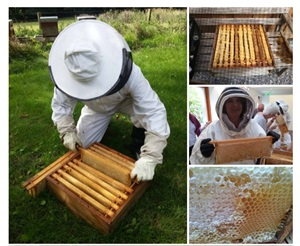
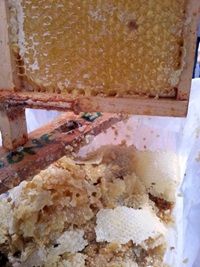
Becoming bee keepers will be no exception. Hives, suits, ‘how to’ books and eventually a nuc of bees will have to be purchased which will take care of birthdays for a while, though I’m not sure what a skateboarding, gaming 15-year-old will think about getting a netted hat for this year’s Christmas present 😉
Thankfully, not rushing into things seems to be a recommended practice when it comes to taking on the responsibility of bees. Meeting other bee folk and attending local meetings has been suggested as the first step before we even begin to part with our money, which is just as well really. Once we meet other bee keepers, find out the highlights and pitfalls we may find second-hand equipment to start us on our way.
After spending a morning watching wax being scraped from honeycombs, being suited up and carrying frames from the hives to the kitchen and just talking and being surrounded by bees and bee people we’re very much looking forward to the next stage of our self-sufficient adventure. We’re already thinking about labelling the jars of honey, candle making and lip balms but it may be some years before I’m blogging about those.
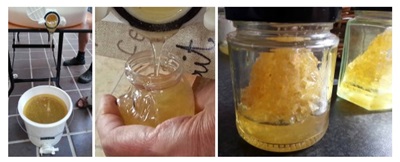
As for our youngest? She loved her introduction to bee keeping. Within a couple of hours she morphed from a screaming, flapping child who couldn’t bear to be in the same room as anything buzzing, into a young girl who is now actively looking for bees in the garden to watch and observe and who can’t wait to get close to a hive and experience the pleasure of dipping her fingers into fresh honey once more.
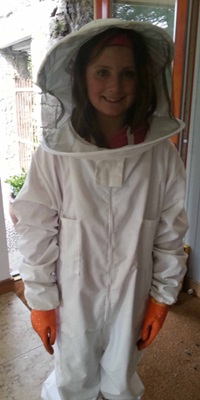
Our Youngest Suited & BootedA self-sufficient lifestyle where you’re baking and making, crafting and farming is possible in the 21st century and there are several very good ‘expert’ books available that will have you believe you can do it in a very short space of time. However, unless you have a large stash of cash hidden away under the mattress, it will take time to achieve – years even. Don’t worry if you can’t afford to head out and grab everything you need off the shelves to begin your ‘Tom and Barbara’ lifestyle. Learning and understanding take time. The lessons you pick up on the way will be powerful ones and the pleasure you experience from eating food you’ve reared or grown will be worth the wait.
As we approach a global population crisis, climate change and a warming planet with all the associated food sovereignty issues that sit alongside them, you never know when even a part-time self-sufficient lifestyle might come in handy…
Useful information to Get You Started
If you’re interested in learning more about bee keeping your first port of call might be a Bee Keepers Association of which there are many both local and national. Look them up, attend some demonstrations or meetings, get some advice and go from there.
If you’re interesting in learning more about growing food contact me (see contact page above) or find a local community garden where you can learn in a hands on environment with others.
Smallholding Ireland have a useful site full of information and links to courses, groups and organisations that can help you on your way to a more self-sufficient lifestyle.
We attended an excellent course on pig rearing from Oldfarm in the spring before we took delivery of our saddlebacks (here’s the blog post about their arrival if you missed it).
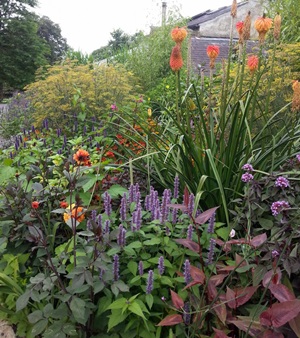
One of the flower borders at Lavistown House, home to the Mid-Kilkenny Beekeepers Apiary

Dee Sewell – a horticulturalist and certified trainer who started Greenside Up in 2009 and teaches people how to grow vegetables. Dee specialises in working with community gardens but also offers workshops, allotment visits, consultations, horticultural therapy, afterschools clubs as well as local talks – she tailors her services to meet clients needs. In 2012 Dee launched a Seed Gift Collection containing varieties of vegetable and insect friendly flowers with the aim of getting more people growing. Dee’s blog was a finalist in the 2012 Ireland Blog Awards in the Eco/Green and Lifestyle Categories.
Source: GreenSide Up – Beekeeping and the Realities of Becoming Self Sufficient – Dee Sewell


